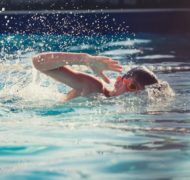Unemployment as Sabbath: Learning to Trust in God
Blog / Produced by The High Calling
Susan Wunderink of Christianity Today reflects on the lessons learned from an extended time of unemployment in “The Sabbath Swimming Lesson: When unemployment threatens to sink us, God keeps our heads above water.” She likens taking a day off from our labor, what the Bible calls “Sabbath,” to swimming lessons:
“When I was a swimming instructor, I spent a lot of time trying to get little kids to float. I would tell them to put their ears in the water and their belly buttons out of it, and I'd say, ‘When I count to two, you won't feel my hands underneath you, but they're there.’ As soon as I'd say ‘two,’ most of the children would frantically jerk their knees towards their chins and flail their arms, dropping their full weight into my hands. Almost all people float when they assume a posture of rest, but people who think they'll sink don't keep that posture for long.
Faith is about a posture of rest, too. Many of us are terrified by the life of faith, needing always to feel the support of steady jobs, steady relationships, and back-up plans. God, knowing that, signed us up for swim lessons. The swim lessons are the Sabbaths.”
God had the Israelites practice the Sabbath in the wilderness during the Exodus (see Exodus 16). God sent the people bread from heaven, manna, every day but one. On that seventh day, they did not go out and gather this strange food. They ate the extra that they had gathered the day before, and they rested.
Wunderink writes,
“Sabbath always points to God's all-sufficiency. To use one illustration, it demonstrates that we do not live by labor alone. To use another, it shows us that God is still there when manna isn't. We are to place our faith in God, a surer bet than the predictable patterns of sowing and reaping.
If Sabbaths are times when we push away from our labor to practice the posture of faith, then Sabbaths are for busy people. They're for parents. They're for graduate students. They're for everyone who fears that God might let them sink. They're for all of us who believe disaster will strike if we stop doing things. They're for me.”
She makes the point that keeping the Sabbath is God’s swimming lessons to teach us to rest in him, even in the difficult times. Even in the times where we cannot provide for ourselves. God is still there.
Therefore, if we have not trained to rest in him with the Sabbath, then when times turn difficult (which, in a fallen world, very often happens), we may find ourselves flailing in the harsh waters, panicking that we will drown.
“Sabbath is an act of both worship and preparation. Preparation for what? For living in faith when the bottom drops out. Observing voluntary days of rest can lay the mental and emotional foundations for enduring involuntary seasons of joblessness.”
The experience of unemployment has been very real for many of us. The stress of not knowing how we can pay the mortgage or provide food for our families has hit millions of Americans in the last several years. And not only that, it is an emotional roller-coaster – the reality that we cannot find work can, in the words of Wunderink, “shed your self-respect.”
But God is always at work for our good, as is promised in Romans 8:28. For Wunderink, she found an unexpected lesson in her unemployment. As she worked through being stressed and worried, she learned that she could rest in God's provision. She learned that what God wants for her is more than her self-sufficiency, but rather trust in God's provision. Her unemployment itself was a Sabbath.
She writes,
"Oh, you'll do fine!" people tell me, when I talk about my once and future job search. "You've got a strong résumé." I suppose most people say these things because they somehow still believe the world is fair. This kind of optimism isn't real encouragement. It's like telling kids to doggy paddle to the edge instead of taking them through the lessons that would help them swim for hours. I know my joblessness was not a cosmic glitch; it was meant to mold me into the posture of faith. God intends to make a swimmer of me, and he was teaching me to rely on him through what seemed like a disaster."
Go to ChristianityToday.com to read the entire article.
Post by Bob Robinson, Faith Editor for The High Calling and the Executive Director of The Center to Reintegrate Faith, Life, and Vocations. Follow Reintegrate's tweets at @re_integrate and Bob's personal twitter at @Bob_Robinson_re





